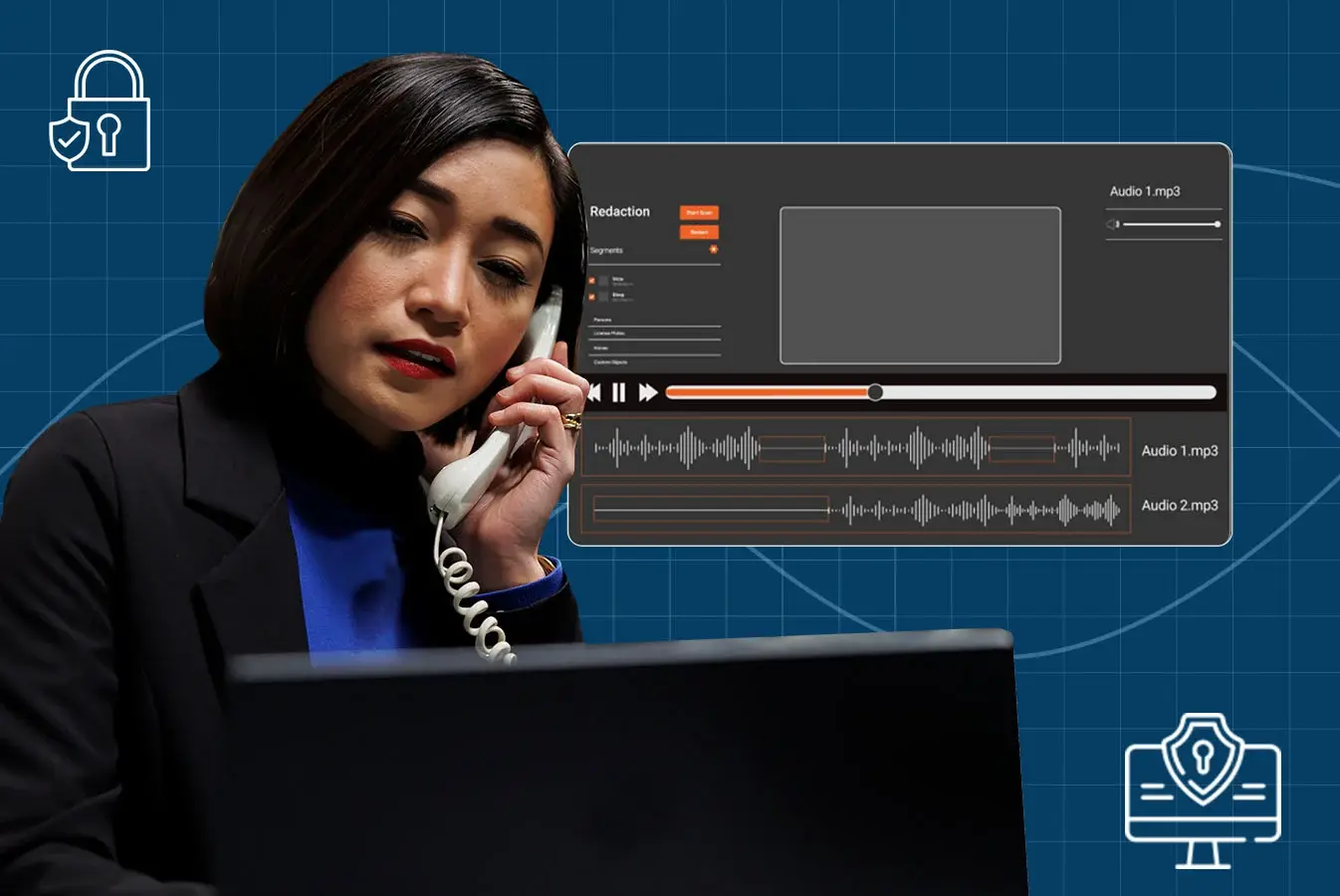Life is an incredible rollercoaster, filled with a blend of joyous highs and challenging lows. Sometimes people go through moments of happiness, and other times they feel helpless and need emotional support to cope with the difficult times and feelings of hopelessness.
In the United States, numerous crisis centers are offering invaluable mental and emotional aid to those in need.
Crisis centers and hotlines play a crucial role in society by providing immediate support to individuals in times of need. These helplines offer a safe space for people to express their concerns and seek assistance on calls.
However, it is essential for a crisis management team to address privacy concerns and understand the role of redaction in preserving the privacy of callers.
In this blog, you will explore the significance of crisis centers and hotlines, the importance of privacy protection, and the role of redaction in protecting caller confidentiality.
Your Lifeline in Tough Times: An Introduction to Crisis Centers
Crisis centers and hotlines are dedicated services that provide support and intervention to individuals facing various emotional and mental health crises.
These helplines typically consist of trained professionals who are equipped to handle different types of emergencies. Some common types of crisis centers and hotlines include:
Mental Health Hotlines
-
Provide immediate support to individuals experiencing mental health crises.
-
Trained professionals offer guidance and referrals to mental health resources.
Domestic Violence Helplines
-
Offer confidential support and resources to victims of domestic abuse.
-
Trained advocates provide safety planning, crisis intervention, and information about legal rights.
Suicide Prevention Centers
-
Focus on preventing suicide and supporting individuals with suicidal thoughts.
-
Trained crisis counselors offer empathetic listening, intervention, and referrals to mental health services.
Understanding the Significance of Crisis Centers in Providing Support to Individuals
The U.S Government recognizes the importance of crisis centers and their role in providing support to individuals in need. These centers serve people facing various challenges and ensure their safety through effective crisis management processes.
In August 2018, the National Suicide Hotline Improvement Act was signed into law, demonstrating the government's commitment to enhancing suicide prevention efforts. This act aims to improve the efficiency and overall performance of crisis centers, ensuring that individuals in danger receive the necessary support and assistance.
The existence of these centers provides a sense of security and reassurance for those seeking help, knowing that they will be taken care of in a compassionate and effective manner.
The following pointers can help you better understand the significance of crisis centers and hotlines:
-
Crisis centers and hotlines offer an accessible and responsive support system when individuals need it the most. By providing a 24/7 service, they ensure help is available at any time, day or night.
-
Crisis centers and hotlines create an environment where individuals can freely express their concerns without fear of judgment.
-
By offering support and resources, crisis centers and hotlines contribute to raising awareness about mental health issues and promoting overall well-being in society.
-
Crisis centers specialize in supporting vulnerable populations that often face unique challenges. They provide targeted assistance to survivors of domestic violence, individuals with mental health conditions, youth at risk etc.
While crisis centers and hotlines offer undeniable benefits, it is crucial to acknowledge the potential challenges that lurk in the shadows. Among the advantages lies a set of challenges that must be addressed.
The challenge of protecting caller’s privacy!
Privacy Concerns Associated with Health Crisis Services
Callers often disclose personal, sensitive, and potentially traumatic experiences. Protecting this information is crucial for maintaining trust and encouraging open communication.
Take, for instance, the disclosure of sensitive personal information by callers, a practice that raises legitimate concerns about personal privacy, which is a fundamental right.
Every individual has the right to have their personal and family life, including their home and private communications, respected by others and by the government.
The Human Rights Act Article 8 emphasizes the importance of privacy and maintaining the confidentiality of personal matters. It states that:
“Everyone has the right to respect his private life and his correspondence. There shall be no interference by a public authority with the exercise of this right except such as in accordance with the law and is necessary for a democratic society, in the interest of national security, public safety, for the prevention of disorder or crime, for the protection of health and morals or for the protection of rights.”
Although crisis centers have the authority to intervene in personal matters during intense times, legal obligations and compliance requirements dictate the utmost protection of personally identifiable information (PII) and any other details that reveal an individual's personal information.
It is imperative to maintain the security and confidentiality of such sensitive data to address individual concerns, foster trust, and meet the necessary compliance standards.
Striking a delicate balance between crisis intervention and privacy ensures the protection of personal information, instills confidence in individuals seeking help, and ensures adherence to relevant regulations and guidelines.
But how do crisis management centers ensure to protect the personal privacy of callers?
Undoubtedly, they need a competent redaction tool in place that saves their valuable time. This tool serves as a time-saving asset, assisting crisis management centers in identifying personally identifiable information (PII) within audio calls and transcripts.
The Role of Redaction in Protecting the Privacy of Callers
Redaction plays a crucial role in protecting the privacy of callers in various contexts, especially in the handling of sensitive information. Redaction refers to the process of selectively hiding certain information from phone call recordings to prevent unauthorized access or disclosure.
Therefore, redaction should be used to safeguard the privacy and confidentiality of callers.
Here are a few scenarios where redaction is commonly used to protect the caller’s privacy:
Call Logs: Redaction is required to hide any personally identifiable information (PII) spoken during call conversations, such as names or addresses. By redacting these details, the privacy of callers is preserved, and the risk of unauthorized access and misuse of this sensitive information is minimized.
Transcriptions: Call transcriptions involve converting spoken conversations into written text. Redaction is often applied to redact sensitive or confidential information within transcripts. This could include financial data, medical information, or other PII that callers may inadvertently disclose.
Redaction processes should be done with great care and consideration to ensure that the appropriate information is obscured while preserving the integrity and usefulness of the remaining data.
Advancements in technology offer innovative solutions for redaction processes, ensuring efficiency and accuracy in protecting caller’s privacy. Crisis centers can utilize these tools to enhance their redaction capabilities.
One such tool is VIDIZMO Redactor!
VIDIZMO Redactor: A Cutting-Edge Solution for Crisis Centers and Hotlines
VIDIZMO Redactor serves as a robust tool for crisis centers and hotlines, enabling them to meet privacy protection needs with efficiency, accuracy, and compliance. By utilizing its advanced features, these organizations can ensure the utmost privacy of callers, building trust and fostering a safe environment for those who are seeking help during times of crisis.

VIDIZMO Redactor is a software designed to detect and redact personally identifiable information (PII), protected health information (PHI), and other confidential data across various media formats such as videos, audio recordings, images and documents.
Using the power of AI, VIDIZMO Redactor detects, tracks and redacts sensitive information, including faces, people, and license plates frame-by-frame within videos.
Moreover, VIDIZMO offers an audio redaction feature to detect and redact sensitive information spoken within specific segments of audio call recordings.
With flexible options like bleep or mute for audio redaction, VIDIZMO adapts to your specific requirements, ensuring the utmost protection of the caller’s privacy.
Are you interested to know more about VIDIZMO redaction capabilities?
Closing Remarks
In conclusion, crisis centers and hotlines play a vital role in providing support and assistance to individuals in distress, ensuring their safety and well-being. However, the protection of the caller’s privacy is equally important, and this is where the role of redaction becomes crucial. By implementing advanced redaction tools like VIDIZMO Redactor, crisis centers can effectively detect and redact personally identifiable information (PII) and other sensitive data from various media formats.
Posted by Sidra Jabeen
Sidra is a Senior Product Marketing Strategist at VIDIZMO. Sidra is actively involved in Research. An expert in Digital Evidence Management System Technologies. For Queries, you can email at websales@vidizmo.com
- Tags
- Redaction



